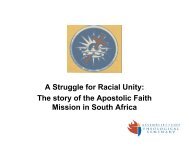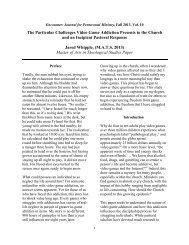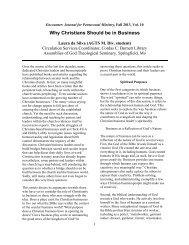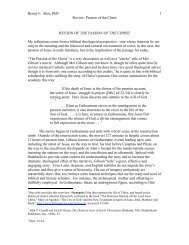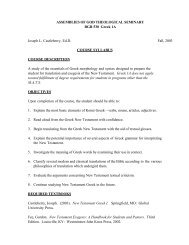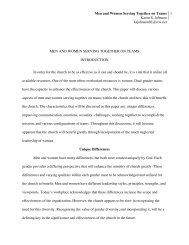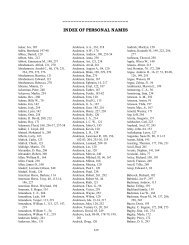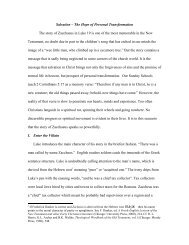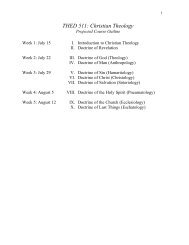Encounter: Journal for Pentecostal Ministry - Assemblies of God ...
Encounter: Journal for Pentecostal Ministry - Assemblies of God ...
Encounter: Journal for Pentecostal Ministry - Assemblies of God ...
Create successful ePaper yourself
Turn your PDF publications into a flip-book with our unique Google optimized e-Paper software.
First and <strong>for</strong>emost, Washburn was willing to<br />
assume two roles traditionally denied to<br />
women within modern <strong>Pentecostal</strong> circles:<br />
senior pastor and president <strong>of</strong> a Bible<br />
college. In 2006, only 3.97 percent <strong>of</strong> the<br />
AG ministers serving as senior pastors were<br />
women. 22 In the fifties it was almost<br />
certainly less. 23 By 1957 when Sister<br />
Washburn established ATBS, little historical<br />
precedent existed <strong>for</strong> women serving as<br />
heads <strong>of</strong> Bible colleges or institutes within<br />
the <strong>Assemblies</strong> <strong>of</strong> <strong>God</strong>. 24 Not only was All<br />
Tribes Bible School the first Bible training<br />
school <strong>for</strong> Native Americans within the AG<br />
since its inception, but Washburn was its<br />
founding principal. 25 She cast her role as an<br />
educator metaphorically in terms <strong>of</strong> that <strong>of</strong> a<br />
“warrior,” protecting the “flock” from<br />
unsound biblical teaching and exploitation<br />
from unscrupulous evangelists. In that way,<br />
she compared herself with David protecting<br />
<strong>God</strong>‟s people against the “giant” Goliath. 26<br />
Despite her non-traditional role as a woman<br />
serving in educational and pastoral<br />
leadership, church historian Angela Tarango<br />
notes that in spite <strong>of</strong> Washburn‟s preeminent<br />
role throughout the fifties and sixties, all<br />
articles in the <strong>Pentecostal</strong> Evangel<br />
highlighting her missionary and educational<br />
activities listed her as “Mrs. Clarence<br />
Washington.” Her first name was not<br />
mentioned in print until her memoirs were<br />
published, and she was always publicly<br />
recognized in conjunction with her husband,<br />
Clarence, who she viewed as an equal<br />
partner in ministry despite his less visible<br />
role. A skilled mechanic, Clarence<br />
Washburn‟s background was essential in<br />
keeping the buses running that regularly<br />
transported students and parishioners to the<br />
Bible School or church. He also helped a<br />
great deal in building and maintenance<br />
tasks. 27 Nonetheless, Alta greatly reverenced<br />
her husband‟s supportive role in<br />
undergirding her ministerial calling. She<br />
5<br />
credits him with encouraging her to remain<br />
faithful to her role when she became<br />
discouraged by the criticism <strong>of</strong> others.<br />
Indeed, Alta regarded Clarence as her<br />
pastor:<br />
My husband rebuked me <strong>for</strong> being<br />
affected by the criticism. Clarence<br />
never felt a call to pulpit ministry,<br />
but he ministered to me in my many<br />
times <strong>of</strong> discouragement. Had it not<br />
been <strong>for</strong> his love, encouragement,<br />
exhortation, and standing by me, I<br />
doubt if I could have accomplished<br />
much <strong>for</strong> the Lord. In the truest sense<br />
he was my pastor. 28<br />
As a woman leading a Bible college,<br />
Washburn had few role models. Among the<br />
few women who had made inroads into<br />
Christian postsecondary education at that<br />
time was Alice E. Luce, a <strong>for</strong>mer Anglican<br />
missionary to India, who joined the AG and<br />
worked among Hispanics. Luce later<br />
founded the Latin American Bible Institute<br />
(LABI), originally located in San Diego,<br />
Cali<strong>for</strong>nia and that later moved to La<br />
Puente, Cali<strong>for</strong>nia. 29<br />
Luce strongly advocated the teachings<br />
earlier promoted in Anglican missionary<br />
Roland Allen‟s 1912 groundbreaking work,<br />
Missionary Methods: Saint Paul’s or Ours?<br />
Like Allen, Luce believed that churches<br />
established abroad should be free from<br />
paternalistic oversight and become selfsupporting,<br />
self-governing, and selfpropagating.<br />
Upon joining the AG in 1915,<br />
Luce spent much <strong>of</strong> her life and ministry<br />
developing indigenous churches among<br />
Hispanics within the United States using<br />
LABI as a thrust <strong>for</strong> this venture. From the<br />
onset <strong>of</strong> her involvement with the AG, Luce<br />
was an articulate spokesperson <strong>for</strong> the<br />
promotion <strong>of</strong> the indigenous church<br />
principle; her writings just prior to the 1921



